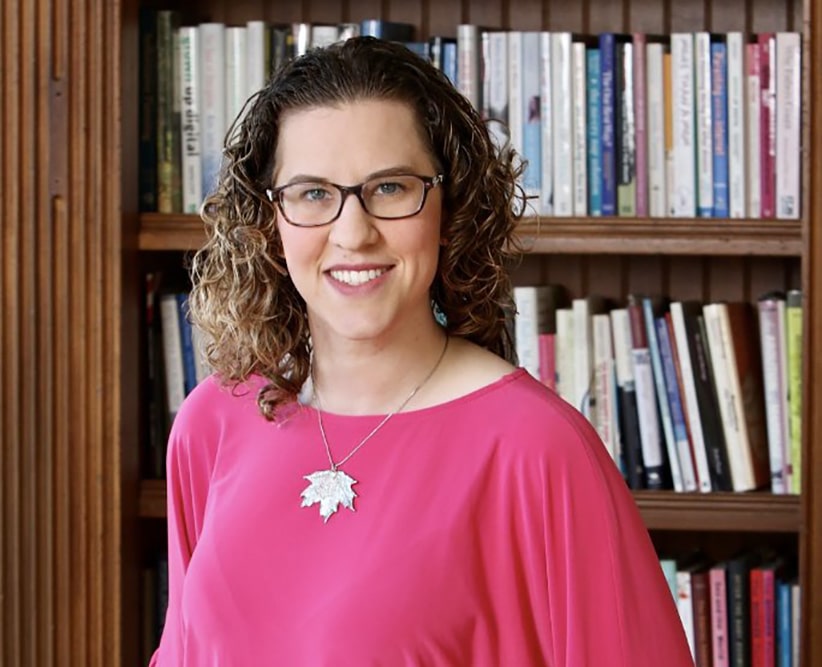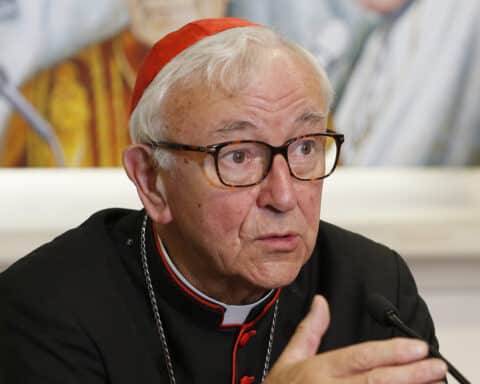(OSV News) –A Canadian woman is relying on her faith, education and personal experience to end euthanasia — and to encourage hope amid end-of-life suffering in her nation.
“Canada deserves to be a warning sign to the world of what road not to go down,” activist Amanda Achtman told OSV News. “It pains my heart, but it also motivates me every day to try to think about how many people are going to be lost, and whose lives will be cut short prematurely, before we finally wake up to the moral urgency that we have here.”
The 32-year-old Calgary native is the founder of the Dying to Meet You project, through which she aims to change the cultural conversation around suffering and death by writing, speaking and creating short films featuring individuals who find reasons to live amid serious illness.
Achtman’s work directly counters Canada’s law on “medical assistance in dying,” or MAID, which since 2016 has exempted from criminal charges doctors and nurse practitioners who either directly administer or prescribe medication to cause a person’s death at their own request. The law includes protocols for ensuring a patient requesting MAID is fully informed and freely consents.
Achtman’s personal mission
On Feb. 5, Archbishop Christian Lépine of Montreal sought to protect a Catholic palliative care home from being compelled to offer MAID, submitting a Feb. 5 appeal to the Quebec Superior Court that asked for an immediate stay on application of a June 2023 amendment to Canada’s Act Respecting End-of-Life Care. The amendment states that “palliative care hospices may not exclude medical aid in dying from the care they offer.”
Achtman, a Catholic, said her mission was inspired in large part by being raised in a Jewish-Catholic family — and by accompanying her grandfather, a Polish Jew, through his experience of dying.
At age 18, she traveled to Germany and Poland to study key places in the Holocaust, the 1933-1945 systematic murder of 6 million European Jews by the Nazi regime and its collaborators.
“A lot of my education … started there when I was traveling to these sites and confronting the history of Nazi euthanasia and eugenics,” she said, citing the outspoken witness of Blessed Clemens August von Galen, bishop (later cardinal) of Münster, against the Nazi’s euthanasia program.
“I’ve always been fascinated by the stories of the Righteous among the Nations,” said Achtman, referencing the honor conferred by Yad Vashem, the world Holocaust remembrance center, on non-Jews who worked to save Jews from Nazi atrocities. “And so this was the ethical education that animated and fired up my moral imagination.”
Connection to suicide
When her ailing grandfather came to live with her during her high school and university years, “the (Canadian) government was talking about legalizing euthanasia for those whose death was deemed reasonably foreseeable,” Achtman said. “And anyone who has an 80- or 90-year-old in their life knows that that means them. I immediately had the sense that this concerned me personally.”
Achtman balances heart and head in her work, drawing on her family life and on her advanced degrees, including a master’s in philosophical studies from the Catholic University of Lublin, Poland, and coursework in the licentiate program in Judaic studies and Jewish-Christian relations offered by the Pontifical Gregorian University in Rome. She has served as the senior adviser to a member of parliament working to prevent the expansion of euthanasia to persons living with a disability or mental illness. In addition, Achtman partners with Canadian Physicians for Life on ethics education and cultural engagement.
Achtman told OSV News she believed that the impetus behind MAID lies partly in what Pope Francis has called a “false sense of compassion” for the suffering.
“Canadians are known for being very nice and compassionate. And we do have a lot of things going for us, but sometimes that’s our demise,” she said. “There’s a sort of decadence that leads us to not be able to contend with suffering.”
At the same time, she said, “There’s a whole other demographic of those who are living in poverty, struggling with addictions, have suffered the trauma of suicide in their family. And we know that there’s a sort of reciprocity between suicide and euthanasia perpetuating within families.”
Euthanasia has been ‘romanticized’
Achtman said that MAID has “definitely been driven” in Canada over the past four decades by the Toronto-based euthanasia lobbying organization Dying with Dignity, founded in 1980 by a registered nurse named Marilynne Seguin.
The organization “has been working to relieve unwanted suffering,” but “it’s sinister to end suffering by ending the sufferer with a lethal injection,” said Achtman, referring to one of the methods used in medically assisted dying.
According to a 2022 listing posted online by the group, pharmaceutical manufacturer Pfizer is listed among the donors supporting Dying with Dignity. However, a Pfizer media relations representative told OSV News that “Pfizer is not a corporate donor to this organization.”
Achtman added that “the promise of an escape from suffering has been romanticized by (Canadian) state media,” specifically the Canadian Broadcasting Corporation.
While journalistic standards typically call for suicide to be responsibly covered (with many news agencies having formal or informal policies against reporting about it) — out of concern for what researchers call a “contagion effect” that could trigger additional suicides — “our state broadcaster has every few days been publicizing and romanticizing stories of euthanasia that glorify premature death,” said Achtman.
On Feb. 11, the CBC posted a first-person article by Kelley Korbin headlined, “My dad’s assisted death was a parting gift. I wish I’d said so in his obituary.”
OSV News asked CBC for clarification of its coverage of suicide and the network responded that “MAID coverage is a news category in itself, where CBC News reports on the ongoing public conversation around a specific way of dying.”
“We include a diverse range of perspectives from medical experts, political actors and commentators, and people sharing personal stories,” Chuck Thompson, head of public affairs of the CBC wrote to OSV News.
Achtman told OSV News that Canada’s Indigenous communities — whom the government itself tacitly admits have not been sufficiently engaged in discussions of MAID — “have a lot to teach the wider Canadian culture about reverence for the elderly.”
Response of Indigenous leaders
While some Indigenous leaders have supported MAID, in 2016, Indigenous Liberal MP Robert-Falcon Ouellette announced he planned to vote against the legislation, expressing concerns over its “ripple effect” among his Attawapiskat community.
“If grandma, grandfather decides they had enough in life … if they weren’t able to carry on, why should I carry on? If they weren’t strong enough, why should I be strong enough?” asked Ouellette.
In contrast, said Achtman, “Pope Francis has been saying in his catechesis on the meaning and value of old age … that the alliance between old and young will save the human family.”
She said that “the top kind of suffering that leads people to request euthanasia by their own admission” is typically “the loss of ability to participate in meaningful life activities.
“Canadians are by and large asking for euthanasia for existential reasons, not physical pain management reasons,” said Achtman.
Ultimately, ending euthanasia is “an act of love,” she said.
“Vulnerability is not a pejorative word, not if you have a right view of the human person,” said Achtman. “Mounting resistance to a person’s suicidal ideation … says, ‘I care about you too much to let you concede to this euthanasia temptation. I will fight for you.’ And sometimes that resistance is all that a person needs and is waiting for.”





